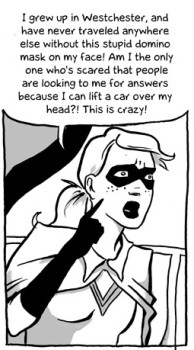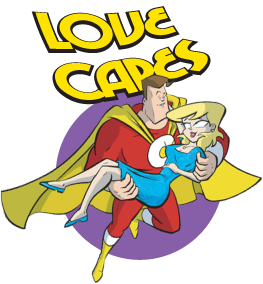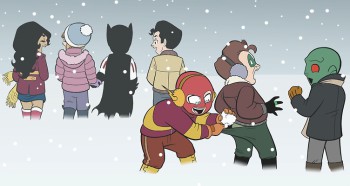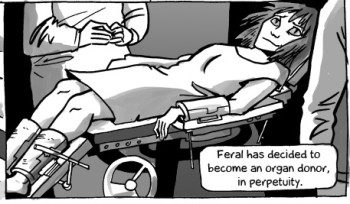Spotlight on Fantasy Webcomics: Do Superheroes Qualify as Fantasy?

There’s a strange divide between superhero fiction and the rest of SFF. It may be because superheroes started out in comics. Almost all the tropes — the spandex, the tights, the rules of combat enforced by the Comics Code of the 1950s — come out of those comic book origins. As more and more superheroes hit the big screen, it hasn’t been surprising to see them in novels, some of them on the literary side of SFF (like Austin Grossman’s Soon I Will Be Invincible, Carrie Vaughn’s “Golden Age” books), and many of them looking at how those tropes play out when you’re not in a visual medium.
So how do you classify superhero webcomics that play with the tropes in the way that those SFF novels have done? Are they fantasy or are they superhero comics, or are those lines really more fluid than the divisions warrant? Either way, three of my favorite webcomics are superhero comics and all of them look at the genre in a way that questions our assumptions about how superheroes work.
What happens when a superhero gets married to a nice, normal girl — and what kind of strengths does it require to be married to someone with a secret identity? What does it matter if you can kick butt and take names if you’re not contributing to solving the big world problems? What is it like to be an 8 year-old superhero? Keep reading and find out how three very different comics are looking at superheroes (and why you should be reading them).

First up, Love and Capes by Thom Zahler. Abby has no idea that her accountant boyfriend, Mark, is actually the Crusader–until he springs his secret on her and his disappearances (tax emergencies?) suddenly make so much more sense. But while the Crusader is often out with his best buddy Darkblade (usually discussing relationship topics in the midst of battle), the focus of the series is on the normal aspects of life. Because as much as Mark loves being the Crusader, he also loves just being Mark. And Abby, for all that she has no superpowers, comes to Mark’s rescue more than once, showing that it doesn’t always take powers greater than common sense and an ability to adapt to strange and bizarre situations to handle time traveling maniacs bent on world domination.
Most of the LNC run has actually already been printed, but Zahler is rerunning it as a webcomic–much to the delight of those who picked up an issue on Free Comic Book Day but don’t have a FLCS (friendly local comic shop). For a print comic, it runs remarkably well as a webcomic; the pacing works as a three-day-a-week strip, something that not all print comics can manage online (and some webcomics have trouble with). Overall, this is a great comic if you like usually-light-hearted fare about relationships, friendships, and the occasional threat of apocalypse.

Another light-hearted take on superheroes is Yale Stewart’s adorable (and yet occasionally heart-wrenching) JL8, a take on DC’s Justice League as elementary schoolers. Stewart does a heck of a job taking characters we already know and love and making them believable as kids–without ever really mocking the adult versions. JL8 is a cross between an homage and a parody, and it features cameos by Neil Gaiman as a bookseller who gives Clark Kent advice in matters of the heart. A fellow comic enthusiast (who originally recommended the comic to me) calls JL8 the best thing to come out of DC in years–despite not being officially affiliated with DC.
On the complete opposite end of the spectrum is Brennan Lee Mulligan and Molly Ostertag’s Strong Female Protagonist. Just by the title, you recognize that the comic will be a critique of superhero literature–but it’s so much more than that. Allison Green, formerly Mega Girl, has given up life as a superhero to go back to school, get her B.A., and try to do something to help the world that doesn’t involve beating up bad guys. This is not because she doesn’t like fighting villains. No, it’s because she realizes that battling monsters in the streets is not actually helping anyone on the grand scale. From Allison’s perspective, the world needs heroes–but they might not need to be super.

As the comic continues, Allison’s backstory comes out, as do tales of her life as Mega Girl. In an arc that centers on Feral, a super who regenerates that Mega Girl once worked with, Allison realizes that she’s not the only one who’s decided there are better ways to improve the world than fighting. Because she can regenerate continually, Feral decides that the way she can best make an impact is to donate her organs to those in need. It’s in moments like this that Mulligan and Ostertag question what the world would be like if there really were superheroes–and look at the sacrifices those people might make to really make a difference. Donning tights and a cape looks good in the media, but saving lives doesn’t have to happen in battle. And sometimes, the consequences of battles are greater than superheroes realize.
I highly recommend all three of these strips, and hope you’ll check them out!
Do you think superhero stories qualify as fantasy? Let me know–and tell me what else I should be reading or playing–in the comments.
Alana Joli Abbott is a reviewer and game writer, whose multiple choice novels Choice of Kung Fu and Showdown at Willow Creek are published by Choice of Games. She is the author of three novels (one recently funded by Kickstarter), several short stories, and a contributor to role playing games. You can find her online at VirgilandBeatrice.com.
In general, I do think that superhero stories are fantasy. Primarily on the basis that most superhero universes include magic and other supernatural phenomenon. I think this stems from the Marvel and DC universes attitude towards magic and etc, in that anything goes, or, follow the Rule of Cool first and foremost. Occasionally, superhero authors set out more strict rules and you get science fantasy (i.e. there are rules about what can and can’t happen, they just don’t match up with the real worlds rules of physics), or even science fiction (I could point at a couple of superhero novels that are declared SF, but that would telling).
— Fritz.
I should have mentioned George R.R. Martin’s _Wild Cards_ as an example of superhero fiction that is science fantasy, and may even be SF.
— Fritz.
Fritz, I agree on the borderline of fantasy/science fantasy — a lot of Marvel’s lore tries to sound like science, even when it’s *bad* science. A friend and I had an ongoing debate about whether they’d bring Doctor Strange into the new Marvel movies cycle, since even with Thor they were trying to pass off magic as science. (They’ve announced Doctor Strange being cast, so I win!)
I’ve heard of _Wild Cards_ but haven’t read it — thanks for reminding me to go check it out!
John Clute somewhat addressed this situation in his encyclopedias.
http://sf-encyclopedia.co.uk/fe.php?nm=masked_avenger
For masked avengers, Clute states “nonfantasy examples include The Scarlet Pimpernel, The Green Hornet, Zorro and The Lone Ranger”. Now, there have sometimes occurred adaptations of Zorro, the Green Hornet and the Lone Ranger which have introduced elements of the paranormal, but in their original pulp or radio versions, they rarely if ever encountered such phenomena to my knowledge. Rarely, if ever, did they ever encounter peculiar foes with gimmicks or outlandish attire. Also of note, all of these properties did precede the debut of Superman and Zatara in 1938 in Action Comics#1, so they may not form part of the genre in that regard.
For The Encyclopedia of Superheroes by Jeff Rovin (1985), where he covered the more prominent indigenous to comic book heroes, as well as some properties that started in prose or film, some intriguing choices occurred; Luke Skywalker, Steve Austin, Superman, the Martian Manhunter, the Fantastic Four, the X-Men, etc. In this 1985 book, Rovin noted that some heroes such as John Carter, Buck Rogers, Indiana Jones, and a few others he would not cover in his 1985 book*.
The inclusion of Luke Skywalker by Jeff Rovin has raised some concerns. I would find it interesting what the reaction would occur if someone referred to Luke Skywalker as a “comic book hero”*, as he does have paranormal telekinetic powers. Someone once wrote ” I do understand what you are saying about Star Wars, but I think that belongs more to the Fantasy genre than to the realm of superheroes and comic books”. Which led to the response “I appreciate your patience in reading my comments, but since [one has] Superman (an extraterrestrial), Wonder Woman (an Amazon with actual powers from the Olympian pantheon), the Avengers (which features member of the Asgardian pantheon), and so forth in the genre, this genre largely forms part of the fantasy genre anyway. In fact, I would not anticipate that someone who enjoys Star Wars and wants a similar experience would enjoy an episode of the Lone Ranger radio show, yet you have various Lone Ranger adaptations listed which lacked the paranormal”.
http://superheroshows.blogspot.com/p/live-action-superhero-show-guide.html
http://www.youtube.com/watch?v=y83YmZuPjRI&lc=TvCIWoKZTbDfqmNcCyYratiJC8BmgdnNHeVM3qTTU5Y
A similar situation occurred here at Youtube: “Star Wars isn’t a super hero movie. Its Science Fiction fantasy”. To which the response “Well, since The Avengers (encounter extaterrestrials), Superman (extraterrestrial who encounters extraterrestrials), Wonder Woman (encounters extraterrestrials), etc. fall into that category, how does that exclude Star Wars? Jeff Rovin included Luke Skywalker with those properties that I just named in Encyclopedia of Superheroes. Also, you refer to He-Man as a comic book hero, but in fact Star Wars has had a longer regular and quite accesible run in comic books than He-Man”.
*Some of you may recall that Jeff Rovin came out with a book called Adventure Heroes in 1994 as a follow-up book where he did cover some of the aforementioned heroes such as Buck Rogers.
There have appeared several Star Wars comic books, some of which came out prior to the release of the film in 1977 as advance marketing. Star Wars comic books have had a more solid presence than those featuring Zorro (in the U.S.), the Lone Ranger, the Green Hornet or the Shadow in the last 35 years or so.
http://www.comixfan.net/forums/showthread.php?t=47448&page=7
For The Encyclopedia of Superheroes by Jeff Rovin (1985), Rovin did provide entries for Conan and Tarzan*. For their entries, he notes in passing other jungle adventurers in prose and film as well as sword and sorcery properties He also provided an entry for Zorro, despite most of, if not all, of McCulley’s Zorro tales lacking the paranormal. In 1994’s Adventure Heroes, Rovin noted these as borderline properties.
Rowling’s Harry Potter debuted in 1996, so how Rovin would have handled him stands as unclear.
*
http://monsterkidclassichorrorforum.yuku.com/topic/47406/loves-ya-baby-Universal-loves-rebooting-Kojak-movie scroll down for Tarzan digression
PB210, thank you for the very thoughtful and well cited comments! The comparison of Star Wars to the superheroes listed in those notes make it very clear just how blurry the genre line is–if it exists at all.
Returning to Star Wars, one notes the parallels between Doctor Doom from the Fantastic Four (debuted 1962) and Darth Vader (debuted 1976 in the advanced marketed novelization).
http://monsterkidclassichorrorforum.yuku.com/topic/51697/Greg-Hatcher-on-the-focus-on-origin-tales#.UvJG8dGPIcA
Hatches notes…..”all the [Joseph] Campbell hoorah was mostly Lucas putting a fig leaf over how much of STAR WARS was lifted straight from comics and old SF serials, trying to persuade interviewers that it was really okay for so many people to like his movie. The original from 1977 owes a hell of a lot more to Jack Kirby than to Campbell; Darth Vader is pretty much a spacegoing Dr. Doom with the serial numbers filed off, and there’s a lot of New Gods in there too. It’s a shame it stuck”.
Aw, but don’t you think there’s some Campbellian influence on the comics, too? 🙂